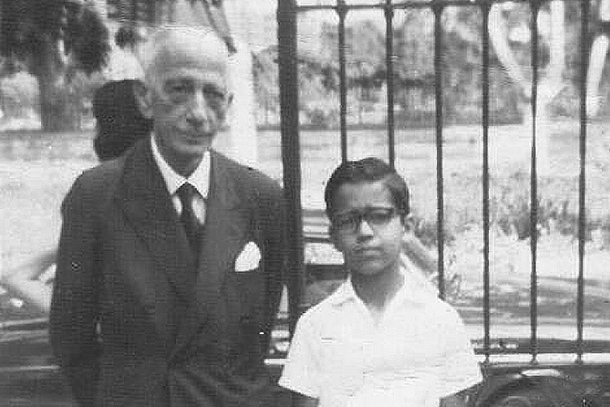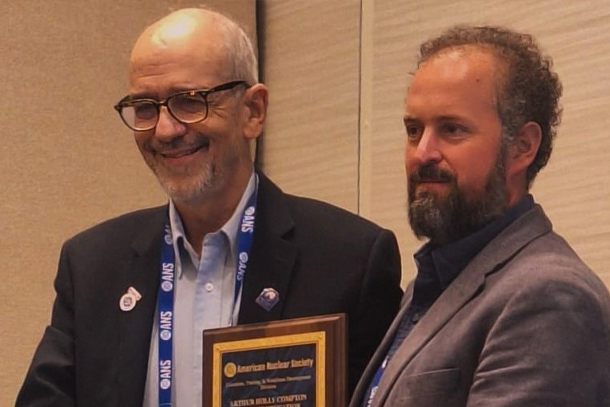
Eight-year-old Arthur Motta, right, professor of nuclear engineering at Penn State, poses in 1964 with his grandfather Arthur Moses, a Brazilian biological scientist, after whom Motta is named. Credit: Provided by Arthur Motta.
Nuclear engineering professor receives award with a long family connection
July 26, 2024
By Mariah Lucas
UNIVERSITY PARK, Pa. — When Professor Arthur Motta was nominated for the American Nuclear Society’s Arthur Holly Compton Award in Education, it was like writing the final notation on a long research publication that began in the 1940s with his grandfather’s scientific career.
Motta, a professor of nuclear engineering in the Penn State College of Engineering, received the $4,000 award in June for his outstanding contributions to science and engineering education, according to the American Nuclear Society (ANS). But what made the award especially meaningful, Motta said, was its connection to his grandfather, Arthur Moses, who was a contemporary of Compton.
“My whole life, my grandfather was the inspiration for my scientific career,” Motta said. “He was somebody everyone looked up to within the scientific community, as he nurtured a lot of his colleagues’ careers as well as the science environment in Brazil. Although he died when I was 12, we did a lot of things together, and our relationship was very meaningful to me.”
Moses, after whom Motta is named, was a Brazilian biological scientist with over 100 publications and one of the founding members and president of the Brazilian Academy of Sciences in Rio de Janeiro.

Arthur Motta (left), professor of nuclear engineering at Penn State, receives the Arthur Holly Compton Award in Education at the American Nuclear Society's annual conference in June. Credit: Provided by Arthur Motta.
In 1941, Compton, an American nuclear scientist and Nobel Prize winner, visited the Brazilian National Academy of Sciences for a symposium on the origin of cosmic rays. He was hosted by Motta’s grandparents during the visit, Motta’s mother recalled to her son. During the same visit to Rio de Janeiro, Compton also completed a diplomatic mission on behalf of the U.S. State Department to ensure Brazil’s support of the Allied forces during World War II.
Compton is known for his discovery of the Compton Effect, for which he won the Nobel Prize in 1927. Taught to all first-year nuclear engineering students, it describes how photons interact with charged particles.
Other notable scientists, such as J. Robert Oppenheimer — the director of the Manhattan Project that led to the invention of the atomic bomb — also visited Motta’s grandparents due to Moses’ position as long-time president of the academy, Motta’s mother recalled to her son.
“This award presents a wonderful story to remember my grandfather by,” Motta said. “He was throughout his life more than a scientist, having an impact much beyond his actual scientific work. It’s this legacy that I have always hoped to emulate in my own career.”
Motta has contributed to nuclear engineering education through teaching, advising and mentoring over a more than 30-year career with Penn State, according to Elia Merzari, professor of nuclear engineering at Penn State, who nominated Motta for the award.
“Arthur’s contributions to education are unparalleled, through his teaching and advising and through the publication of a textbook widely used in undergraduate and graduate courses around the world,” Merzari said. “Additionally, his foundational contributions to Penn State’s nuclear engineering program cannot be understated. I have come to admire Arthur as a scientist, nuclear engineer, teacher, leader and mentor.”
Motta has advised over 50 graduate students who have gone on to research careers in nuclear laboratories and universities in the U.S. and aboard. For his efforts in advising students, he was awarded the Penn State Engineering Alumni Society Outstanding Advising Award in 2001.
Motta’s research interests, which center on the behavior of nuclear materials in the reactor environment, have yielded over 190 publications, review articles and book chapters.
He is a fellow of ANS, and previously received the ANS Mishima Award for outstanding contributions in research and development work on nuclear fuel and materials.
Motta received his bachelor’s degree in mechanical engineering and master’s degree in nuclear engineering from the Federal University of Rio de Janeiro and a doctorate in nuclear engineering from the University of California, Berkeley. He has taught at Penn State since 1992.

